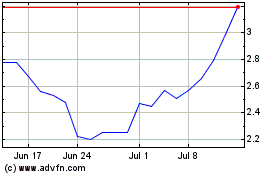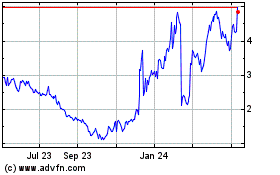G1 Therapeutics Presents Data on COSELA™ (trilaciclib) at ASCO on Potential Immune Activation in Patients with Newly Diagno...
June 04 2021 - 9:01AM

G1 Therapeutics, Inc. (Nasdaq: GTHX), a commercial-stage
oncology company, today presented results from analyses evaluating
the immune effects of trilaciclib in patients with extensive-stage
small cell lung cancer (ES-SCLC) following two Phase 2 clinical
trials. Results of the analyses, presented at the American Society
of Clinical Oncology (ASCO) annual virtual meeting, demonstrated
that patients receiving COSELA prior to chemotherapy had greater
peripheral T-cell clonal expansion than patients receiving placebo.
The goal of clonal expansion is to amplify the number of specific
lymphocytes (B-cells and T-cells) to enable the body to have
sufficient numbers of antigen-specific lymphocytes to mount an
effective immune response. The eAbstract is available in
the scientific publications section of G1’s
website.
“Mounting a robust immune response against a tumor necessitates
sufficient numbers of antigen-specific T-cells to recognize and
combat the cancer cells,” said Raj Malik, Chief Medical Officer at
G1 Therapeutics. “In our genomic analysis of tumor cells and
peripheral blood cells, we found that administration of COSELA
prior to chemotherapy resulted in an expansion of newly-detected
peripheral T-cell clones. This clonal expansion was associated with
clinical response and is indicative of anti-tumor immune
enhancement. We are encouraged by these preliminary results and
look forward to clarifying the potential immune enhancing effects
of COSELA in the tumor microenvironment.”
The genomic analysis of DNA followed two Phase 2 trials in
patients with ES-SCLC. Researchers subsequently evaluated patient
tumor cells and peripheral blood to quantify the abundance of
specific T-cell receptors at baseline and after treatment with
either COSELA or placebo prior to chemotherapy (either first-line
etoposide plus carboplatin (E/C) or E/C plus atezolizumab (E/C/A)).
The results of the analysis presented in the eAbstract include the
following:
- In both studies, peripheral T-cell
clonal expansion was greater among patients receiving COSELA versus
patients receiving placebo.
- Among patients receiving E/C:
- Patients receiving COSELA who
demonstrated an antitumor response had significantly more
peripheral clonal expansion than placebo responders (P=0.04) and a
greater number of tumor-associated expanded clones (P=0.03).
- COSELA responders had more newly
detected expanded peripheral clones compared with placebo
responders (P=0.06) and COSELA non-responders (P=0.02).
- Increased clonal expansion in
trilaciclib responders was more evident after two cycles of E/C
versus four, suggesting that trilaciclib results in a rapid T-cell
response.
- Among patients receiving E/C/A:
- Patients receiving COSELA who
demonstrated an antitumor response had significantly more
peripheral clonal expansion than placebo responders (P=0.002) and
COSELA non-responders (P=0.016), and a greater number of
tumor-associated expanded clones.
- COSELA responders also had more
newly expanded peripheral clones compared with placebo responders
(P=0.003) and COSELA non-responders (P=0.02).
- There was no increase in
tumor-associated expanded clones among trilaciclib responders
compared to placebo responders, possibly due to the time point
(after four cycles) at which clonal expansion was assessed.
G1 Therapeutics also presented a poster at ASCO describing the
design of PRESERVE 2, the Company’s ongoing Phase 3, randomized,
double-blind trial of COSELA in patients with locally advanced
unresectable or metastatic triple-negative breast cancer.
(poster)
About Small Cell Lung Cancer
In the United States, approximately 30,000 small cell lung
cancer patients are treated annually. SCLC, one of the two main
types of lung cancer, accounts for about 10% to 15% of all lung
cancers. SCLC is an aggressive disease and tends to grow and spread
faster than NSCLC. It is usually asymptomatic; once symptoms do
appear, it often indicates that the cancer has spread to other
parts of the body. About 70% of people with SCLC will have cancer
that has metastasized at the time they are diagnosed. The severity
of symptoms usually increases with increased cancer growth and
spread. From the time of diagnosis, the general 5-year survival
rate for people with SCLC is 6%. The five-year survival rates for
limited-stage (the cancer is confined to one side of the chest)
SCLC is 12% to 15%, and for extensive stage (cancer has spread to
the other lung and beyond), survival rates are less than 2%.
Chemotherapy is the most common treatment for ES-SCLC.
About COSELA™ (trilaciclib) for Injection
COSELA (trilaciclib) was approved by the U.S. Food and Drug
Administration on February 12, 2021.
IndicationCOSELA™ (trilaciclib) is indicated to
decrease the incidence of chemotherapy-induced myelosuppression in
adult patients when administered prior to a
platinum/etoposide-containing regimen or topotecan-containing
regimen for extensive-stage small cell lung cancer.
Important Safety InformationCOSELA is
contraindicated in patients with a history of serious
hypersensitivity reactions to trilaciclib.
Warnings and precautions include injection-site reactions
(including phlebitis and thrombophlebitis), acute drug
hypersensitivity reactions, interstitial lung disease
(pneumonitis), and embryo-fetal toxicity.
The most common adverse reactions (>10%) were fatigue,
hypocalcemia, hypokalemia, hypophosphatemia, aspartate
aminotransferase increased, headache, and pneumonia.
This information is not comprehensive. Please click here for
full Prescribing Information.
https://www.g1therapeutics.com/cosela/pi/
To report suspected adverse reactions, contact G1 Therapeutics
at 1-800-790-G1TX or call FDA at 1-800-FDA-1088 or visit
www.fda.gov/medwatch.
About G1 Therapeutics
G1 Therapeutics, Inc. is a commercial-stage biopharmaceutical
company focused on the development and commercialization of next
generation therapies that improve the lives of those affected by
cancer, including the Company’s first commercial product, COSELA™
(trilaciclib). G1 has a deep clinical pipeline and is executing a
tumor-agnostic development plan evaluating COSELA in a variety of
solid tumors, including colorectal, breast, lung, and bladder
cancers. G1 Therapeutics is based in Research Triangle Park, N.C.
For additional information, please visit www.g1therapeutics.com and
follow us on Twitter @G1Therapeutics.
G1 Therapeutics™ and the G1 Therapeutics logo and COSELA™ and
the COSELA logo are trademarks of G1 Therapeutics, Inc.
Forward-Looking Statements
This press release contains forward-looking statements within
the meaning of the Private Securities Litigation Reform Act of
1995. Words such as "may," "will," "expect," "plan," "anticipate,"
"estimate," "intend" and similar expressions (as well as other
words or expressions referencing future events, conditions or
circumstances) are intended to identify forward-looking statements.
Forward-looking statements in this press release include, but are
not limited to, those relating to expectations for the commercial
launch of COSELA (trilaciclib), the therapeutic potential of COSELA
(trilaciclib), and COSELA’s (trilaciclib) possibility to realize
the economic impact in the US market presented in the scientific
analyses described above, and COSELA (trilaciclib) may fail to
achieve the degree of market acceptance for commercial success, are
based on the company’s expectations and assumptions as of the date
of this press release. Each of these forward-looking statements
involves risks and uncertainties. Factors that may cause the
company’s actual results to differ from those expressed or implied
in the forward-looking statements in this press release are
discussed in the company’s filings with the U.S. Securities and
Exchange Commission, including the "Risk Factors" sections
contained therein and include, but are not limited to, the
company’s ability to complete a successful commercial launch for
COSELA (trilaciclib); the company’s ability to complete clinical
trials for, obtain approvals for and commercialize any of its
product candidates other than COSELA (trilaciclib); the company’s
initial success in ongoing clinical trials may not be indicative of
results obtained when these trials are completed or in later stage
trials; the inherent uncertainties associated with developing new
products or technologies and operating as a commercial-stage
company; and market conditions. Except as required by law, the
company assumes no obligation to update any forward-looking
statements contained herein to reflect any change in expectations,
even as new information becomes available.
G1 Therapeutics Contact:
Will Roberts
Vice President, Investor Relations & Corporate
Communications
919-907-1944
wroberts@g1therapeutics.com
G1 Therapeutics (NASDAQ:GTHX)
Historical Stock Chart
From Mar 2024 to Apr 2024

G1 Therapeutics (NASDAQ:GTHX)
Historical Stock Chart
From Apr 2023 to Apr 2024
